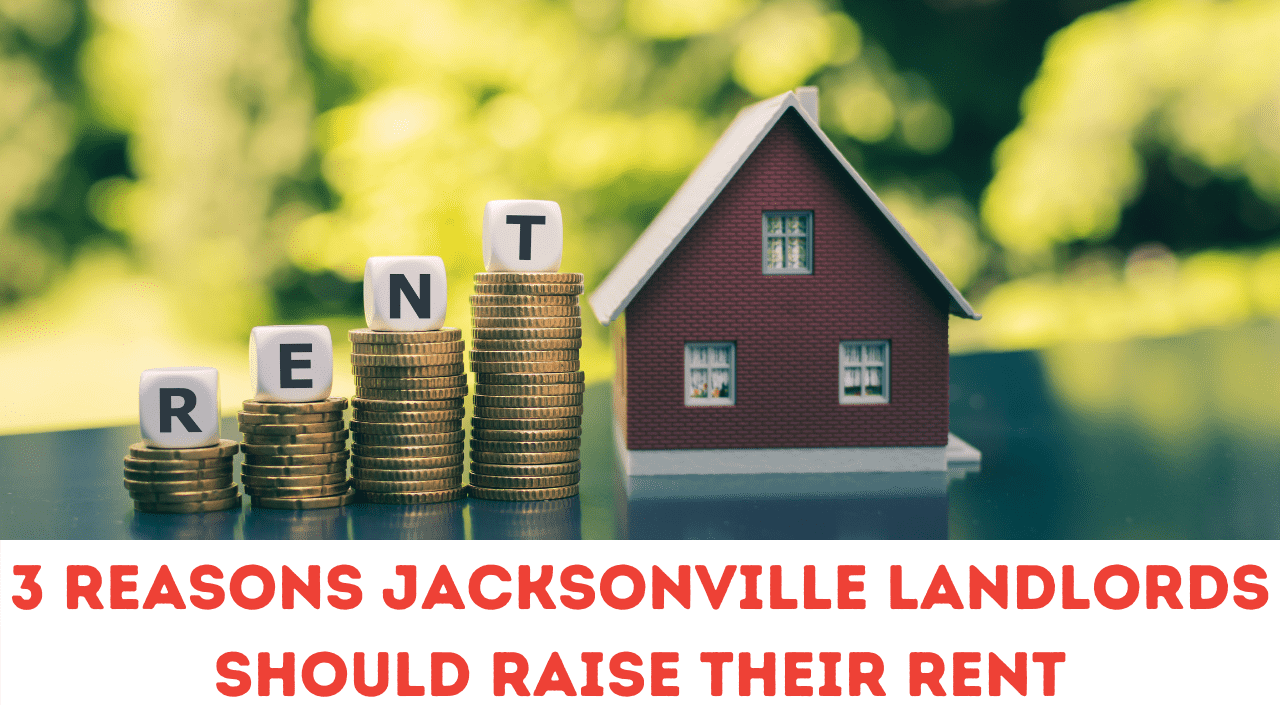3 Reasons Jacksonville Landlords Should Raise Their Rent

A few weeks ago, I came across an article written by a self-managing landlord. It was called: “Other landlords may think I’m foolish because I’ve barely raised my tenants’ rent in 10 years, but there are 3 reasons I know I’ve made the right decision.”
You can read the story here: https://www.businessinsider.com/personal-finance/reasons-barely-raised-tenants-rent-years-2020-11
The author could have easily shortened that title to: “3 reasons why I’m foolish about rental income,” but I won’t be judgmental. Instead, I’ll tell you why it’s actually important for landlords to raise the rent on their properties.
Keep Relationships Professional with Your Jacksonville Tenants
It’s easy to understand the author’s point of reference. They do not use the services of a professional property management company. They seem to be completely hands-on, and they are likely to be personal friends with their tenants.
I get it. It would be difficult as a caring, self-managing landlord to not have a cordial, working relationship with someone occupying your rental property. We are all human, but there must be boundaries in place with those relationships.
A landlord must not lose sight of the landlord-tenant relationship, which is governed by a lease agreement and civil law. If things go downhill with a tenant, and you should always expect and be prepared for that to happen, any goodwill discounts on that rent payment will be quickly forgotten.
There are three reasons to raise the rent:
- Low rent does not guarantee you will have an excellent tenant experience.
- Low rent does not offset the expense of a turnover.
- Low rent does not buy any extra time in your life to enjoy what’s important to you.
Let’s talk about these.
Finding Good Tenants for your Jacksonville Rental Property
Renters are not hard to find. Rental markets are different all over the country. Here in Florida, there is no shortage of tenants seeking available rental housing. Depending on your price point, the time of year you are looking to place a tenant, how effective your rental marketing is, and how strict your rental qualifications are, it should not be a problem to find a renter in a reasonable amount of time.
The author of this article is only interested in “excellent renters.” What makes a renter “excellent” and how can you possibly determine their level of excellence during the applicant screening process?
They talk about a negative experience with one tenant, who did thousands of dollars’ worth of damage to one of their rentals, but they had good experiences with all the others. That raises a lot of questions:
- What did the landlord miss during their screening process that would have denied their ability to rent the property?
- What happened in the life of the one bad tenant that influenced them to cause such extensive damage to the property?
- Did the landlord fail to inspect their property, losing the opportunity to have an early intervention on the damage?
- Was that tenant behind on rent and did they get evicted?
The most important question, however, is: Why would that one negative experience justify keeping rental rates low?
It is prudent to charge a market-rate rent so that if you have a bad tenant experience, then the expenses incurred from the damage are less painful to your budget.
But, the real consideration is that you may attract a lower quality tenant if the rent price is too low. You should use your rental rate as a screening tool.
Lower rent does not guarantee good tenants.
Turnover Costs and Rental Income in Jacksonville Rental Properties
There is no doubt that tenant turnover is probably the most expensive event for a landlord to experience. Contrary to the author’s point, turnover is unavoidable. It is going to happen more than once. Sometimes it happens on schedule, but life is unpredictable. The length of a tenancy is no exception to this fact. There may be a job change, or a change in family status. There may be growth in the tenant’s family, requiring more space that the rental home can’t offer. They may even decide to buy a house, and you can bet that won’t line up with the natural end of the lease agreement.
So, why would a landlord expect that a tenant will always hold to the lease agreement when it would be much more suitable for them to part ways so they can put their own family in a better situation?
In a lot of ways, that lease agreement is only worth the paper it’s written on. Hopefully you have a security deposit to guarantee the tenants fulfill the lease agreement, but even that modest amount may not be enough to make them stay when their own logic and reasoning will make them still choose to break their lease.
Long term tenants are not guaranteed. You have to expect turnover costs.
Here’s what you can guarantee: wear and tear expenses.
Whether you have a good tenant or a bad tenant, a long term tenant or a short term tenant, things in your rental property are going to need repairs and replacements. Towel bars will be loose. Toilet flappers will need to be replaced. Carpet is going to get worn and dirty. Walls and trim will get bumped, scratched, and dinged. A lower rental amount will not prevent things from happening.
What is the number one thing you will you need to address wear and tear?
MONEY.
Whether that money comes from the rent, or the security deposit, or from your own repair reserve, it’s a necessary piece of this process. Here are the questions you have to ask:
- Have you kept up with pricing for all the parts needed to maintain a house?
- Do you know how much the price of skilled labor and trades is going up, year by year?
- The price of goods and services is constantly going up. Does it make sense for your renter to enjoy a low rent amount if you can’t afford to keep up with the cost of repairs on the property?
- If the HVAC stops blowing cold air in the heat of summer or the water heater goes out on Friday afternoon before a long, holiday weekend, do you think your tenant will be forgiving because you’ve been so generous in your monthly discount of rent? Possibly, but I can assure you it’s not likely to happen that way.
The tenant will demand immediate service for all the right reasons, and they will point to the lease agreement and to landlord-tenant law, threatening to withhold rent, etc. Even after a tenant moves out, you’re still going to need money to get the property rent-ready for showings and for a new tenant.
Low rent does not offset the cost of a turnover.
Protecting Your Time as a Jacksonville Landlord

I agree that time is money. However, the idea that lower rent saves you time is counterintuitive at best, and nonsensical at worst.
If you’re a self-managing landlord, you’re not enjoying passive income as a real estate investor. Instead, you’re working a part-time job. It’s a side hustle that often doesn’t make much money when you’re handling everything yourself and resisting rental increase.
Rental property owners who truly value their time set up a rental property business that does make money. Making money requires rental increases. Even better, they will hand over the management of their rental property to a professional property management company. Then, the income generated by the rental property is truly passive income.
Jacksonville property managers are going to charge market rent for rental homes. They will handle every aspect of the rental property, leaving landlords with no involvement in the business of managing the home. This is how passive income is generated.
Low rent does not buy any extra time in your life to enjoy what’s important to you.
Think about how you’re handling your rental property and whether you could be earning more with routine rental increase. If you’d like to learn more about our Jacksonville property management services and how we can bring value to your life while enhancing your experience as a landlord, please contact us at Red Rooster Property Management.
